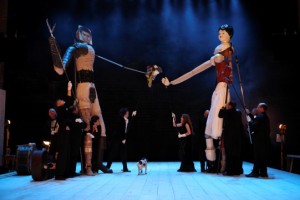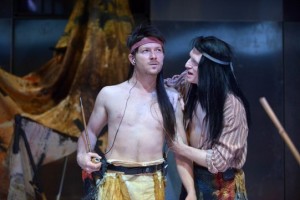It is up to us to capture [the audience’s] attention and compel its belief. To do so we must prove that there will be no trickery, nothing hidden. We must open our empty hands and show that really there is nothing up our sleeves. Only then can we begin.
This quotation from Peter Brook’s 1968 book The Empty Space appeared in the programme for his 1970 A Midsummer Night’s Dream. Last week I saw two Shakespeare productions in Stratford-upon-Avon that reminded me of Brook’s theory of performance.
The productions were Troilus and Cressida, a collaboration between the RSC and The Wooster Group in the Swan Theatre, and A Midsummer Night’s Dream (As You Like It), performed in Russian with surtitles in the Royal Shakespeare Theatre.
A Midsummer Night’s Dream began with the cast noisily removing a full-size tree that was lying across seats in the auditorium, followed by a metal fountain that sprays the audience with water. If you’re expecting to see the forest outside Athens, or Theseus’s court, you can forget it, they seemed to be saying. Instead we were in the world of slapstick, mime and circus. It soon became clear the only part of the play being performed would be the story of Pyramus and Thisbe, the play which the mechanicals perform for the court at the end of Shakespeare’s play. The cast lined up in front of us, motionless, while the screen behind them played an announcement for us to read. The actors had spent so long analysing and discussing every aspect of the story that they hadn’t had time to rehearse. The play wasn’t ready, so what we were going to see would be a rehearsal. The audience was already charmed.
And so the story began, played out by two 15′ high unwieldy puppets, skeletal figures, requiring the concentration of all the actors to move them. The simple act of Pyramus giving Thisbe a bunch of flowers took several minutes. Thinking about Peter Brook’s statement, there was very little up the actors’ sleeves, and they were certainly capturing the audience’s attention. The fun continued with singing, a quartet of ballet dancers and of course the performing dog. This playful approach, vividly theatrical and very funny, was communicated without the need for the spoken word.
Over in the Swan, it seemed to me they’d had the same problem, too many discussions about theory, not enough thought given to the actual performance.
Troilus and Cressida‘s a notoriously difficult play about the Trojan War, neither comedy nor tragedy. The Trojans were played by the Wooster Group, Greeks by a group of RSC regulars, the two groups rehearsing separately. The Wooster Group’s performance style was, well, unusual. Dressed as American Indians, all miked, they reproduced the movements displayed on monitors positioned round the stage showing a film about an Inuit tribe which became a Hollywood romance for the love scenes between Troilus and Cressida. They spoke in flat monotones. I was told afterwards that over their earpieces the actors were hearing words in the accent being used, but not Shakespeare’s words. No wonder the actors seemed so disconnected from the audience: their job was to reproduce what they could see and hear, and speak their lines, not to interpret them. They may not have been using illusions as such, but they did exclude the audience.
In a famous moment, Hamlet says the point of playing is “To show… the very age and body of the time his form and pressure”. The presentation felt to me like a warning against the over-use of technology in our time leading to losing the power to communicate, and the danger of copying the behaviour seen in Hollywood films.
It was ironic that the play was being performed in the Swan Theatre, the RSC’s most dynamic performance space. The RSC regulars, playing the Greeks, brought an energy to the stage completely lacking in the Wooster Group. For me, though, it was too late. I was already too bored to be engaged.
I have to leave it to others to explain what this production says about the nature of theatre. It felt to me like a blind alley, but some people have loved it, and here’s a link to Andrew Cowie’s review which is followed by many responses.




Interesting blog, Sylvia. I haven’t seen A Midsummer Night’s Dream yet but thanks for the link to my blog on Troilus And Cressida. The danger in trying to explain the production is I then fall into the trap of narrowing the range of valid responses to their work, which The Wooster Group are at pains to avoid, but as an educator I think all art, whether it’s as obscure as Shakespeare’s language or as abstruse as The Wooster Group’s stage practice, can be and should be available to everyone and the danger of the ‘here it is, make of it what you will’ attitude is that it widens the gulf between people educated in contemporary performance theory and everyone else who just shrugs and goes ‘Huh?’.
The basic premise for The Wooster Group is post-structuralism. Structuralism, as defined by Ferdinand Saussure, said we all recognise the same signs, so artists can use those signs to transmit meaning from them to us, but post-structuralism says we all interpret signs differently depending on our class, age, education, social status, etc. so, as Roland Barthes says in his essay The Death Of The Author (http://www.deathoftheauthor.com/) , “a text’s unity lies not in its origin but in its destination.” Therefore as an artist all you can do is present your work with no idea of its reception.
The Wooster Group have insanely long rehearsal periods and research obsessively to give the audience the richest and most densely-layered art work possible to respond to but the work of art is the show, not its source text, and a lot of the technology, like the videos and earpieces, are to help stop the actors telling you what everything means and to free the audience to find in it whatever is meaningful to them. I thought Erin Sullivan got it right when she said it’s like an art installation and I personally found fascinating the conflict between the RSC Greeks trying to impose structure and meaning, both as actors and as characters, and the Wooster Group Trojans as a soft, pliable medium through which meaning can be found or made.
I suspect what has particularly pissed the RSC audience off about Troilus And Cressida is that, having spent many years learning how to read Shakespeare in performance – and don’t forget, the vast majority of people don’t go to the RSC, find that shouty, spitty acting style ridiculous and the prospect of Shakespeare in performance unbearable – were confronted with an art work constructed to rules which are just as rigorous as, but completely different from, The English Shakespeare Tradition so all their cultural capital was declared redundant.
Thanks for your explanation Andrew, good to hear from you! As you can tell this production wasn’t my cup of tea at all and I found it a very alienating experience. Audibility and visibility was awful in the second gallery. I realised pretty quickly that they were deliberately not “presenting” the play, but kept on hoping the style might change!
I wouldn’t generalise about the audience: the night I went a whole group of teenagers clustered around the loos, obviously as mystified as me.
I’m all for experimenting, and the new CoriolanUs production sounds like an interesting use of technology. I’ve missed it, but have you seen it?
No, I haven’t seen Coriolanus either, Sylvia. Fair comment about the generalisation but I still suspect it might be fair to say a baffled young person might think; I don’t get it because I don’t know enough about this form of theatre, while there seem to be some older audience members who are not so much baffled as angered as if the production has tricked them somehow. It will be interesting to see if the mixed reaction to the recent crop of experimental productions makes the RSC bolder or more timid under Greg Doran.
I saw the Wooster Group perform Vieux Carre in Edinburgh two years ago and it was, without exception, the worst piece of theatre I have ever seen (and I include Peter Stein’s production of Troilus and Cressida). To a British audience, the Wooster Group seem to go against every aspect of textual clarity that we take for granted. They used the same tricks with microphones flattening the voices, lots of TV screens and a few video cameras. They certainly seeemed intent on boring the audience into submission. They may well have spent months rehearsing the play but there was little sense of time well spent.
What seemed bizarre about the current production was the original pairing with Rupert Goold. His work may use plenty of high-tech tricks but his Shakespeare productions (including his work in Northampton) have always been characterised by a basic trust in the text, regardless of what eventually happens to it on stage. It is very much in a tradition belonging to Sam Mendes, Trevor Nunn, John Barton et. al. One can only speculate about what the production might have looked like with the original director on board.
I sincerely hope that the current adverse reaction does not scare off the RSC from employing innovative and provocative directors in future (rather than the emperor’s very old clothes courtesy of the Wooster Group.)